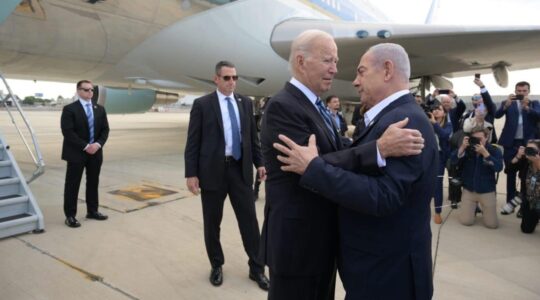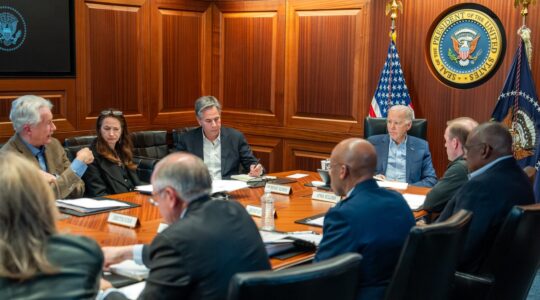(JTA) – Two summers ago, Israel was dropping bombs on Hezbollah strongholds in Beirut and fighting a low-level war in the Gaza Strip with Hamas. Just last September, Israeli fighter jets bombed a site in the Syrian desert that Israeli officials privately described as a nascent nuclear installation.
Today, with Hamas’ hold on Gaza as strong as ever, Hezbollah rearmed and refortified in Lebanon, and Syria signing new defense pacts with Iran, Israel is eschewing military force for another approach: talking.
In the past few weeks, Israel has entered into a cease-fire agreement with Hamas, launched Turkish-mediated peace talks with Syria, told Lebanon it is willing to talk about trading the disputed Shebaa Farms in exchange for peace and engaged in indirect talks with Hezbollah about swapping prisoners.
Why the sudden change of heart?
“It’s the Middle East – why are you surprised?” quipped veteran Israeli political commentator and columnist Nahum Barnea. “The only unusual thing is the scope: Suddenly at once there are negotiations on several fronts. Taking each one individually, I don’t see anything new.”
Examined separately, each development makes sense on its own merits, and some are the culmination of months-long efforts rather than signs of change in Israeli policy.
But taken together, three key factors are driving what may be emerging as a new Israeli diplomatic approach toward its Arab neighbors: Iran’s growing sphere of influence, the limits of Israeli military power and, some say, Prime Minister Ehud Olmert’s political troubles.
Perhaps the most compelling reason for the latest major development on the Israeli-Arab front, the Hamas-Israel cease-fire, was that Israeli airstrikes, shelling and pinpoint counterterrorist operations in the strip had failed to neutralize the Hamas threat from Gaza and bring quiet to the residents of southern Israel. The truce that went into effect last week had succeeded – at least until Tuesday, when several Kassam rockets landed in Sderot.
It was not immediately clear whether the rocket fire would spell the end of the cease-fire or whether it was a temporary aberration.
“Clearly, yes, we’re seeking political solutions because we recognize how difficult it is to find military solutions,” said Yossi Alpher, a former director of Tel Aviv University’s Jaffee Center for Strategic Studies and co-editor of Bitterlemons.org, a Palestinian-Israeli Web site.
“Certainly it’s very hard to find military solutions for the Iranian-supported, non-state actors we’re facing in Hezbollah and Hamas,” he said. “This is one of the explanations for the way the Hezbollah war ended and the cease-fire with Hamas.”
Having learned firsthand from his 2006 experience in Lebanon the pitfalls a major military incursion into hostile Arab territory could carry – heavy Israeli casualties, uncertain outcome, lack of an exit strategy – Olmert passed on his preference for an IDF operation in Gaza and, listening to the advice of his Cabinet and Defense Minister Ehud Barak, opted for the cease-fire.
This truce is part of Israel’s strategy to neutralize threats from a range of Iranian proxy militias and allies along its borders, including Hezbollah and Syria.
In Israel’s talks with Syria, the Jewish state is most interested in removing Damascus from Iran’s orbit and choking off Iranian support for Israel’s enemy in Lebanon, Hezbollah.
The thinking behind this is twofold: If talks are successful, Iranian power and influence would suffer, and Iran would be in a worse position to use its proxies in Syria, Lebanon and elsewhere to respond to a potential Israeli attack on Iranian nuclear facilities.
Second, merely engaging Syria in negotiations and holding out the promise of embrace by the West motivates Syrian moderation and slows Syria’s slide toward the fundamentalist regime in Tehran.
“It’s very important that there are negotiations,” said Shlomo Avineri, a professor of political science at Hebrew University. “When there are negotiations, you don’t shoot. The question is what happens when you get to the finish line of negotiations.”
In theory, the same goes for Hezbollah and Hamas.
“Iran is today the prism through which Israel looks at all of its security issues,” Alpher said. “If we’re negotiating with Syria, it’s because of Iran. Hamas, too, is seen as part of the long arm of Iran.”
But Israeli officials take pains to point out that there is a key difference between the peace tracks with Syria and the Fatah-led Palestinian Authority, and indirect communication with the likes of Hamas and Hezbollah, both designated terrorist groups.
“There are no direct talks with Hamas,” David Hacham, Arab affairs adviser in the Israeli Defense Ministry, told JTA.
Moreover, he says, the fact that all these developments are happening simultaneously are mere coincidence. The government always has been interested in doing whatever is necessary to advance peaceful relations with its neighbors. And, he notes, this is not the first time Israel has conducted peace talks with Syria, reached a cease-fire with Hamas or had indirect contacts with Hezbollah over a prisoner swap.
“It’s a coincidence,” Hacham said. “There is no change in Israeli policy.”
But Michael Oren, a senior fellow at the Shalem Center, says Olmert is turning Israel toward negotiations in an attempt to save his government.
“He’s generating a raison d’etre for the government,” said Oren, the author most recently of “Power, Faith, and Fantasy: America in the Middle East.”
Israeli political analysts are divided over whether or not the multifront negotiating push constitutes an attempt by a scandal-plagued prime minister to deliver something historic during his term, or whether it’s a cynical ploy by Olmert to outmaneuver his political opponents and appear indispensable so he can stay in office.
Oren says he does not believe Olmert would cede the Golan Heights to Syria merely to stay in power, but he does believe Olmert is steering his government leftward, toward negotiations, to preserve his coalition.
“Certainly it doesn’t hurt him politically,” Oren said. “His only hope is to maintain a left-of-center coalition.”
The prime minister rejects such insinuations.
“The prime minister and the government he heads are fully committed to seeking and achieving peace with all of Israel’s adversaries,” the Prime Minister’s Office said in a statement to JTA. “This has always been Israel’s position and it will spare no effort to achieve these goals.”
Ultimately, Oren says, Olmert’s turn toward negotiations, particularly with Hezbollah and Hamas, sends a very dangerous message.
“What we have now is very weak diplomacy,” Oren said. “We’re negotiating with Hamas from a position of weakness, and that’s the way it’s seen in the entire Arab world. We’re negotiating with Hezbollah having performed weakly in a war.
“We’re not negotiating from a position of strength on any of these fronts.”





